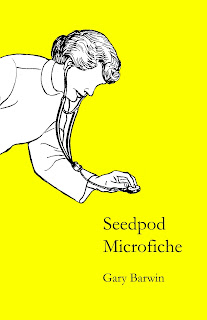On small press publishing and above/ground press in particular
 |
| my new chapbook from above/ground |
Alejandro Bustos interviewed me for an article about rob mclennan's above/ground press. The article, which includes discussion from other writers is here on Apt 613.
He asked me a number of questions and since there wasn't enough space to include my answers, where I wax rhapsodic about above/ground press and about small press in general, I thought I'd post the full text of the answers that I sent him.
What does the work of above/ground press mean to you?
Over its long life (at least as poetry publisher), above/ground has continued to introduce me to writers and work that I didn’t know about. The production values are down-and-dirty which means that rob mclennan is able to create an amazing number of various kinds of publications (periodicals, chapbooks, pamphlets) at a very low cost and make them very widely available. His approach puts the work and its accessibility first. Though I've grown to like the slightly grungy aesthetic: quick, subversive, a bit dangerous, non-compliant.
When did you first hear about a/g press?
How has it evolved, if at all, since your first interaction? I don’t know when I first heard about it-- I think my process of discovery was one of osmosis. It seems like a/g was always here. Whenever I looked around, there would be another one of these publications featuring perhaps a very well known writer, or someone I’d never heard of. And often I’d run into rob at literary events and he’d hand me a handful of little books. “Here, check these out.” Or I’d mail him twenty bucks and I’d receive a big stack of a/g publications. It has always surprised me, the range of people he has published: From Pulitzer Prize/National Book Award winners to first-time published poets.
The meaning of paper publication is different than it once was. There is lots of work available online, but, though a/g hasn’t changed much – rob publishes the work as regularly as the tide -- coming across these physical objects – these little chapbooks and pamphlets – is different now. I’m surprised again and again at the electricity that can be generated by just a few sheets of folded paper!
Poets are often overlooked by the press and publishers. Given that this article will be written for an audience that is comprised mostly of non-writers, can you please explain how critical a publisher like a/g press is.
It’s vital that writers and readers have access to engaging writing that exists outside of the strictures of commercial publishing. Of course there is lots of great writing that makes money, but there is also lots of exciting and engaging writing that, by its nature and the nature of publishing, can’t exist within the commercial framework. Presses like a/g allow these writers to be published and allow readers to read their work. I’d use a nature metaphor: Commercial writing is writing that is domesticated or harvested in some way. I see the work published by presses like a/g as writing in its wild form. So rob, as editor, is more a wilderness guide than combine harvester.
For those outside of Ottawa: Given that you do not live in the National Capital Region, I would be interested in hearing your view on the poetry scene here.
My impression is that the scene is very vibrant. There are many fantastic people doing interesting things, not only in terms of creating great writing, but in terms of supporting and promoting the work of others through small & micro press publishing, innovative reading series, performers, blogs, etc. For example, to name just a few people: Cameron Anstee, Max Middle, Pearl Pirie, rob mclennan, Amanda Earl, jwcurry. There are initiatives that exist in Ottawa that don’t exist in the same way in other places. Not living in Ottawa, it’s always exciting to hear about what is happening there.

Comments